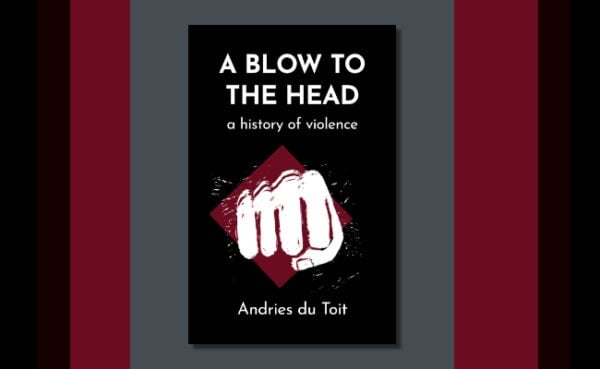
Title: A blow to the head
Author: Andries du Toit
Publisher: Modjaji Books
ISBN: 9781991240255
It’s an ordinary day. You go to the local gym, where you’ve been a member for years. After swimming some laps, you sit down at one end of a long table at the coffee shop inside the gym, and respond to emails while sipping a delicious cappuccino.
Out of the corner of your eye, you become aware of three men who enter and sit at the other end of the table. They are loud and jovial, but when the young black woman serving them gets their order wrong, one says something offensive to her, repeating the slur.
It’s one of those moments that require a decision. Do you say something to the man, who is white and Afrikaans-speaking, as you are? If so, what do you say? Or do you keep your head down and mind your own business?
This real-life scenario happened to Andries du Toit, author of the work A blow to the head, a title which gives away one of the consequences of his decision to speak up, although the actual assault occurred only three weeks later and was inflicted by another party. But one of the strengths of the book is that Du Toit doesn’t stop at describing the physical consequence, which has left him with a disability, but explores the historical and metaphorical associations and ramifications of this event, as alluded to in the subtitle: “A history of violence”. By his account, he said something mild but appropriate, unleashing a chain of events that read like a movie, illustrating how, should you scratch the surface of a normal day, you might discover an underworld that acts with impunity and rules to instil fear.
In this engagingly honest and vulnerable work, Du Toit tracks his own family history in apartheid South Africa and his involvement as director of PLAAS, an NPO concerned with land issues. The blow to his head served to wake him up out of a complacency, and to an idea that he knows what is going on and what to do about it, though understanding that those interventions might be naïve. This contemplation was not only a cerebral exercise, but occurred as a result of the writing, as did a sense of his coming to terms with what happened.
The role of writing in resolving symptoms of post-traumatic stress disorder has been well researched1 – the act of putting the trauma down on paper helps to integrate the shock of untoward events into the narrative of one’s life.
As an adolescent, Du Toit recalls, he found James Baldwin’s book The fire next time among his father’s paperbacks. He:
somehow gleaned from it a sense of how writing could be a way of grasping thoughts that would otherwise slide by unremarked; a way of taking a fiery chaos of feelings and making something beautiful of it. How writing could be a way of making yourself known to yourself −and to the world; a way of making a self, of becoming someone.
I was thoroughly absorbed by this well-written and valuable contribution to exploring the current difficulties in our country, and how we have arrived at this juncture. Things are not what they seem, and this book gave me more insights about the conundrums we face as a society in a gentler way than receiving a blow to the head.
Note
1 Dawn Garisch is a medical doctor and a founder member of the Life Righting Collective: www.liferighting.com.

